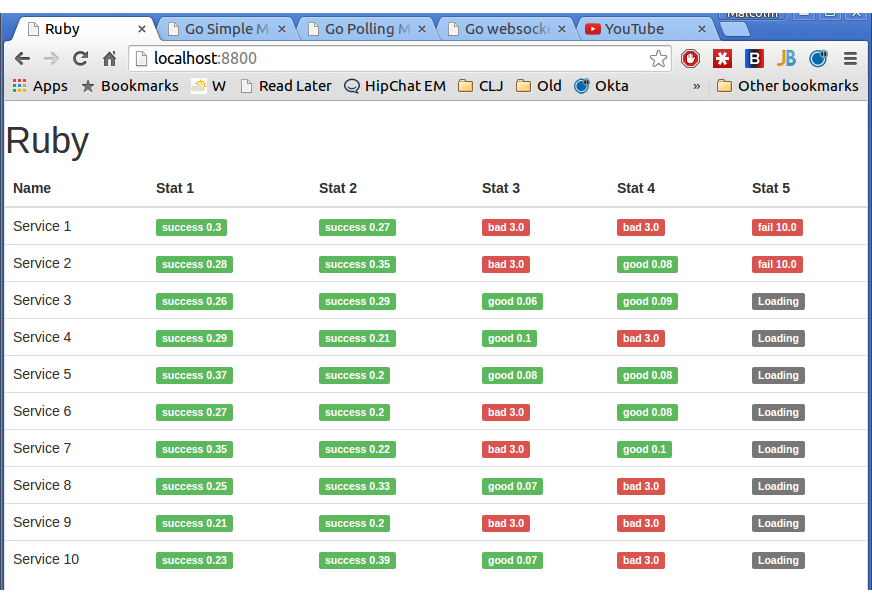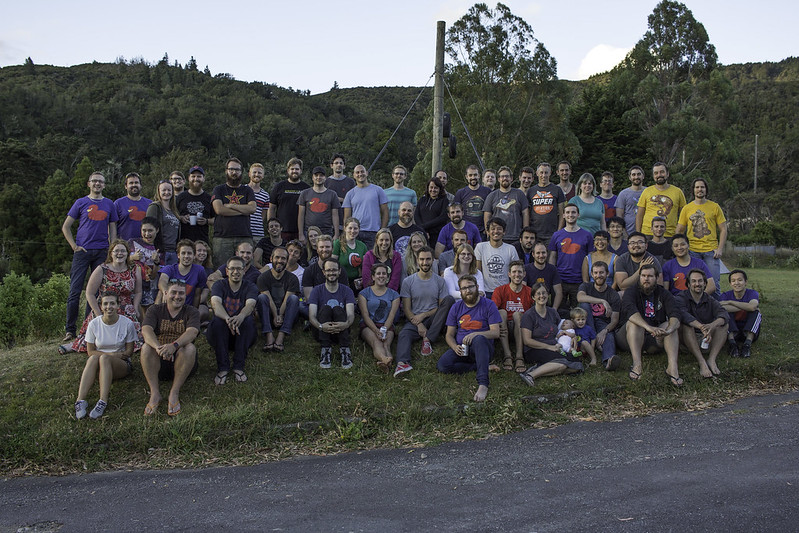- Real Gopher! Kickstarter project
- Dave Cheney - SOLID Go Design Video from Golang UK
- Paul Bellamy - Advanced Patterns with io ReadWriter Video from Golang UK
13 Sep 2016, 16:30
28 Mar 2016, 17:30
I attended Railscamp 2016 in Wellington NZ last weekend. Just wanted to collect a couple of notes on some stuff I saw there.
- The location was YMCA Camp Kaitoke, which was a really awesome venue. There was a lot of really awesome beer from local breweries too! Really good other drinks and stuff. Just above is a view from the deck of the main area.
- Saw an interesting talk by @raquelxmoss about “Creating a welcoming space for beginners”, she wrote up some notes here: http://www.raquelmoss.com/creating-a-welcoming-space-for-beginners/
- I got a chance to have a chat with Raquel about increasing diversity in the programming/IT/Tech industry. I realize that I am bad at this and would like to help (well, atleast not scare away women from learning and/or being included in technology stuff). Raquel also linked me to really useful resource here: http://conference.hopper.org.nz/ which I must study soon.
- Saw a really interesting talk from @terrcin about “Monday Madness! or Why we don’t use Scrum, and what we do instead”. He ran the same talk for the Auckland Ruby meetup, which I was unable to make it to due to something coming up last minute. That was a shame, but I’m looking forward to seeing slides soon as I thought there were a bunch of really awesome ideas there.
- There was a strong interest in Elixir and Phoenix. On the last night the question was asked: “Who has worked on or thought about Elixir/Phoenix stuff this weekend” with approximately 1⁄3 of the room putting up their hands. Maybe we are going to see a mass surge in use soon… I think aside from Machine Learning, Elixir is the next thing I want to learn - it has a lot of really interesting stuff, and seems really pretty easy to learn and understand. Also thee were a few talks about it, like this from Nigel who works for AddressFinder: http://blog.addressfinder.com.au/post/141506070132/elixir-new-tool-in-the-toolkit
- Warewolf (the game) was extremely popular, and many games were played. I think Railscamp is a little bit of a misnomer, maybe something like “Beer and Warewolf camp” might be more accurate. It was really a great time.
- The Ruby NZ AGM was held - that was kind of interesting. Cool to see a proper organization that “fosters and supports the Ruby programming language, its users and community in New Zealand”.
- Also - Art of Railscamp
- Couple random pictures on Flickr here: https://www.flickr.com/groups/2957873@N23/
- There are many more things I’m forgetting.
So as a full time Go developer now with very little to do with Ruby, why did I go to Railscamp? Because the Ruby community is awesome. I definitely want to go to future events! Thanks to the organisers and everyone else for making it a great long weekend.
TODO: Think about starting a Railsn00bs meetup in Auckland.
10 Aug 2015, 00:00
Quick, what is wrong with this Go code?
package main
import (
"log"
"math/rand"
"sync"
"time"
)
func main() {
var wg sync.WaitGroup
for i := 0; i < 100; i++ {
wg.Add(1)
go doWork(i, wg)
}
log.Println("Starting to wait")
wg.Wait()
log.Println("Done")
}
func doWork(i int, wg sync.WaitGroup) {
defer wg.Done()
sleepTime := time.Duration(rand.Int31n(10000000))
time.Sleep(sleepTime)
log.Printf("%d slept for %d", i, sleepTime)
}
Answer - the WaitGroup is passed as a value. Internally WaitGroups are structs with a contained integer that gets atomically incremented and decremented. So by passing a value, the internal count gets copied and the copy gets decremented when Done() is called. So this is a deadlock. Fixed code here, simply pass it as a pointer. Helpfully Go will warn you about this:
$ go vet wg-gotcha.go
wg-gotcha.go:23: doWork passes Lock by value: sync.WaitGroup contains sync.Mutex
exit status 1
So, moral of the story: Don’t pass WaitGroups around by value, and always run go vet!
09 Aug 2015, 17:30
A co-worker built a simple internal tool in Ruby with Sinatra. This tool is essentially a simple front end to a bunch of little simple REST apis. It is a bit slow, but that is okay a ~30 second load time is okay since it is only occasional internal use. I thought to myself looking at the code, with not much more effort you could build a solution in Go / Golang that would work a whole lot better. This isn’t the most scientific of comparisons, and you could do a better job with EventMachine - but for now, this is about simulating what the ‘real life’ ruby solution looks like. The whole project is available on Github here: https://github.com/segfault88/rubyvgo1 so you can follow along.
The API
I built a simple simulation of the APIs being called. I threw something together in Go, basically it’s like this: * /slow - sleeps for 200-400 ms then returns * /bad - approximately 50% of the time sleep for 50-100 ms then return, otherwise wait 3 seconds and return * /timeout - wait 10 seconds then return
The whole thing is simply this:
package main
import (
"fmt"
"math/rand"
"net/http"
"time"
"github.com/zenazn/goji"
"github.com/zenazn/goji/web"
)
func slow(c web.C, w http.ResponseWriter, r *http.Request) {
n := time.Duration(200 + (rand.Int31n(200)))
time.Sleep(n * time.Millisecond)
fmt.Fprintf(w, "Done %d ms", n)
}
func bad(c web.C, w http.ResponseWriter, r *http.Request) {
if rand.Float32() <= 0.5 {
n := time.Duration(50 + (rand.Int31n(50)))
time.Sleep(n * time.Millisecond)
fmt.Fprintf(w, "Done %d ms", n)
} else {
time.Sleep(3 * time.Second)
fmt.Fprint(w, "This api is bad!")
}
}
func timeout(c web.C, w http.ResponseWriter, r *http.Request) {
time.Sleep(10 * time.Second)
fmt.Fprint(w, "That took a while!")
}
func main() {
rand.Seed(time.Now().UnixNano())
goji.Get("/slow", slow)
goji.Get("/bad", bad)
goji.Get("/timeout", timeout)
goji.Serve()
}
Ruby implementation
The entire Ruby version with Sinatra looks like this:
require 'rubygems'
require 'sinatra/base'
require 'net/http'
PORT=8000
class MyApp < Sinatra::Base
get '/' do
send_file 'index.html'
end
get '/slow' do
t1 = Time.now
Net::HTTP.get(URI("http://localhost:#{PORT}/slow"))
"success #{(Time.now - t1).round(2)}"
end
get '/bad' do
t1 = Time.now
Net::HTTP.get(URI("http://localhost:#{PORT}/bad"))
t = Time.now - t1
" 0.5 ? "danger" : "success"}\">#{t > 0.5 ? "bad" : "good"} #{(t).round(2)}"
end
get '/timeout' do
t1 = Time.now
Net::HTTP.get(URI("http://localhost:#{PORT}/timeout"))
"fail #{(Time.now - t1).round(2)}"
end
end
So it looks like this:

The first 2 columns load 2-400ms. Column 3 and 4 loads in 50-100ms 50% of the time, 3 seconds otherwise. Column 5 takes 10 seconds.
Go simple
Go’s net/http package is GREAT. We can make a similar system, that actually looks pretty similar to what we do in Ruby. All we need is this:
func slow(c web.C, w http.ResponseWriter, r *http.Request) {
t1 := time.Now()
_, err := http.Get(fmt.Sprintf("http://localhost:%d/slow", Port))
if err != nil {
panic(err) // most basic version, lacking error handling
}
fmt.Fprintf(w, "success %s", time.Now().Sub(t1))
}
This is great, it loads a bunch faster. However, the tool works by doing an AJAX request for each ‘cell’. Normal brower rules means that only 2 AJAX requests can be outstanding. So it loads a bit faster, and potentially allows more users (the Ruby version only has 2 workers which get blocked when doing the API call), it’s not that much faster. Sadface, fail. Let’s try another way.
Go polling
So, let’s kick off go-routines immediately on page load, then send updates in batches. Check out the whole file here: https://github.com/segfault88/rubyvgo1/blob/master/go-poll/main.go - this is pretty easy, the interesting part is really this:
func callSlow(i int, j int, wg *sync.WaitGroup, r *chan Result) {
defer wg.Done()
t1 := time.Now()
_, err := http.Get(fmt.Sprintf("http://localhost:%d/slow", APIPort))
panicIfErr(err)
*r <- Result{i, j, "success", fmt.Sprintf("success %s", time.Now().Sub(t1))}
}
Here we simply feed the result out on a channel and use a waitgroup to keep track of when the scan is done. Then, when the browser comes along, all we do is package up the updates waiting in the channel and send it along as JSON:
response := struct {
Messages []Result `json:"results"`
Done bool `json:"done"`
}{
make([]Result, 0),
scanner.done,
}
// grab all the waiting results
func() {
for {
select {
case m := <-scanner.results:
response.Messages = append(response.Messages, m)
default:
return
}
}
}()
// marshal and send json
json, err := json.Marshal(&response)
panicIfErr(err)
w.Header().Set("Content-Type", "application/json")
w.Write(json)
This works muuuch faster!
Go websocket
Since we’re here, lets also try a websocket. Using the “github.com/gorilla/websocket” library makes it a snap to upgrade to a websocket. Again, the code is here: https://github.com/segfault88/rubyvgo1/blob/master/go-websocket/main.go - all you need to do is:
var (
upgrader = websocket.Upgrader{
ReadBufferSize: 1024,
WriteBufferSize: 1024,
}
)
func wsRoute(w http.ResponseWriter, r *http.Request) {
ws, err := upgrader.Upgrade(w, r, nil)
if err != nil {
log.Println(err)
return
}
scanServices(ws)
}
Then you can go ahead and use the websocket to write messages straight to the browser. This is definately the fastest way to go!
func callSlow(i int, j int, wg *sync.WaitGroup, r chan Result) {
defer wg.Done()
t1 := time.Now()
_, err := http.Get(fmt.Sprintf("http://localhost:%d/slow", APIPort))
panicIfErr(err)
r <- Result{i, j, "success", fmt.Sprintf("success %s", time.Now().Sub(t1))}
}
Now pull from the channel, marshal the JSON and write it to the client:
for {
select {
case msg := <-messages:
json, err := json.Marshal(msg)
panicIfErr(err)
ws.WriteMessage(websocket.TextMessage, json)
}
}
Easy, and really fast.
Comparison
I did a quick record to a YouTube video to show the relative versions.
Ruby is slow, it’s stuck with 2 workers so it blocks a lot. The go version is a fair bit faster, but the limit of 2 outstanding AJAX connections makes it slowish. The polling version is pretty good, and the websocket version is excellent.
Conclusion
So the original idea for this post is to show that with a little more effort, it’s easy to get a much better result working in Go. If you look a pure number of lines the go websocket version is something like 3x more than Ruby. However, it works so much faster, will ‘scale’ and IMO easier to work with in the future.
Questions, comments? Hit me up on twitter or github. Happy hacking!
09 Aug 2015, 00:00
First post. Time to resurect this blogging thing!
Lorem ipsum dolor sit amet, consectetur adipiscing elit. Etiam malesuada quam eu justo luctus dapibus. Etiam dictum tellus eu velit mollis imperdiet quis nec nulla. Suspendisse a lectus et lectus hendrerit vulputate lobortis vel sapien. Fusce eleifend nisl eu vestibulum scelerisque. In rutrum lorem magna. Fusce sit amet maximus eros. Ut ullamcorper justo in metus viverra tempus. Aenean placerat sit amet nisi vel viverra. In non pellentesque dui. Nullam auctor vel sapien vehicula mollis. Vestibulum faucibus mollis ipsum vel sodales. Duis eget erat ut purus fermentum malesuada.
def openFile(path):
# syntax highlighting test
file = open(path, "r")
content = file.read()
file.close()
return content
That’s easy!
func slow(c web.C, w http.ResponseWriter, r *http.Request) {
n := time.Duration(200 + (rand.Int31n(200)))
time.Sleep(n * time.Millisecond)
fmt.Fprintf(w, "Done %d ms", n)
}
Noice!.

